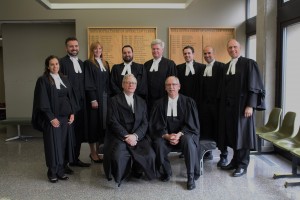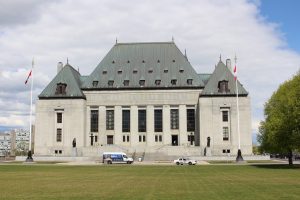- Will Lawyers In Canada Soon Face A Religious Test? The Hypersensitive Response Over Canada’s First Openly Christian Law School
- BC Law Society Approves TWU Law School Graduates
- The Cold Chill of the Legal Profession’s Rejection of Religious Freedom
- A Referendum On Religious Freedom
- Lawyers’ Referendum Not Just About TWU – It’s About Our Commitment To The Rule Of Law
- Called To Participate, But Not At The Table
- Hearing Update On Trinity Western University v. Nova Scotia Barristers’ Society
- Breaking News Supreme Court of Nova Scotia rules in favour of Trinity Western University …. more to come
- Space Enough For All: Nova Scotia Supreme Court Makes Decision on Trinity Western University Law School
- The Strange Case of Nova Scotia Barristers’ Society Appeal of the TWU Ruling
- CCCC Granted Intervener Status In TWU Case in British Columbia
- The Onward March of TWU: Next Step The Court of Appeal
- Trinity Western University and the Legal War of Attrition: Isn’t It Time To Let Diversity Flourish?
- Charitable Status of Un-Popular Opinion
- CCCC Denied Intervener Status at Ontario Court of Appeal
- CCCC Granted Intervener Status at the BC Court of Appeal on TWU Case
- Sending a Message to TWU: Your Graduates Need Not Apply
- Recent Happenings: CCCC Files Factum At BC Court of Appeal; Bussey appears on TV
- CCCC at the British Columbia Court of Appeal
- The Experts Demand Deference: Law Societies & TWU
- The Intolerance of Intolerance: The Outrageous Accusation That TWU’s School of Law Is Related To The Orlando Massacre
- Being On the Right Side of History: Where the Offended Take Away Religious Freedom
- Nova Scotia’s Highest Court Rules in Favour of TWU
- Common Sense Prevails at the Nova Scotia Court of Appeal
- Bussey on John Gormley Show
- Nova Scotia Barristers Society Will Not Appeal
- BC Court of Appeal On TWU
- Developing Story: BC Court of Appeal Rules 5-0 in favour of TWU
- The Decision That Has Changed Everything For TWU
- Law Society of BC Appeals TWU To Supreme Court of Canada
- Bussey in Vancouver Sun: Appeal court ruling on Trinity Western University is a game changer
- The Legal Revolution Against Religion
- Supreme Court Grants Leave On TWU
- Supreme Court Grants 9 But Denies 23 Groups Intervener Status In Landmark Case
- Canadian Council of Christian Charities Granted Intervener Status in TWU Case: The Supreme Court Changes Course On TWU Interveners
- Australian Group Interviews Bussey on Equality and Freedom of Religion
- Bruce Clemenger’s Video Message on TWU Case
- Oral Argument of CCCC on TWU at the Supreme Court of Canada
- June 15 TWU Decision To Be Released
- TWU Loses: Canada’s Religious Freedom Forever Altered
- The Constitutional Promise of Religious Freedom Betrayed
- TWU Drops Mandatory Community Covenant

Court House in Halifax
The Nova Scotia Barristers Society (Society) was “discomforted” by Trinity Western University’s (TWU) Community Covenant which, “in addition to mundane items” noted the Nova Scotia Court of Appeal (Court), “prohibits sexual intimacy outside the marriage between a man and a woman.”
However “discomforted” the Society may have felt about that Covenant, it had no jurisdiction to punish a TWU law graduate in its attempt to punish the University. As the Court put it, “Trinity Western’s law graduate is not Trinity Western’s alter ego.” Well said. The Court’s decision is a helpful reminder of just how out of step the Society became with its campaign of political correctness by overreaching its jurisdiction in an attempt to control the admissions policy of a law school in another province, British Columbia.
When one steps back and considers what the Society tried to do, one cannot but be amazed at the height of hubris. Consider this: a Nova Scotia entity charged with the solemn responsibility to protect “the public interest” in the practice of law in its province, answered the call of critical academics and activists that the Society must show its disapproval of a British Columbia law school because it is “discomforted” by the religious practice of marriage as being between one man and one woman on that campus. The Society gave itself the jurisdiction to decide that TWU’s Community Covenant was discriminatory against potential LGBTQ applicants, and that it violated the Charter and human rights legislation and therefore was “unlawful.”

The Court of Appeal rightly rejected the Society’s power grab. In the first place, the Court noted that TWU is a private university, as recognized by the Supreme Court of Canada in 2001, and therefore not subject to the Charter. It was illogical for the Society to suggest that TWU violated the Charter when it is not even subject to the Charter! “Trinity Western did not “unlawfully” violate an enactment that has no application to it,” the Court held.
Further, the Court of Appeal noted that there was no statutory authority for the “Society to issue an independent ruling that someone has violated Nova Scotia’s Human Rights Act.” There was not one “supportive word” in any legislation that gave the Society such authority. Nor, said the Court, was there any ability for the Society to establish its own “court of competent jurisdiction under the Charter with the authority to rule that someone’s conduct in British Columbia unlawfully violated the Charter.”
The Society’s role in protecting the “public interest” in the practice of law is to ensure that a person practicing law has the required “knowledge and skill of a person trained in the law.” To the extent that the Society needs to approve an institution to ensure law graduates obtain the proper education is within its jurisdiction. What is not in the Society’s bailiwick is to focus on matters at a university not related to the practice of law. By implication lawful religious beliefs and practices are not related to legal practice.
Common sense is an apt description for this decision. The Court was not amused that the Barrister’s Society unilaterally declared jurisdiction to govern admissions policies that have nothing to do with the general competence to practice law. If only the Ontario Court of Appeal had followed a similar course.

TWU Counsel Brian Casey and Kevin Sawatsky with the counsel of interveners supporting TWU’s position
It truly is remarkable that TWU has been forced onto this arduous road of legal attrition over an issue already settled by the Supreme Court of Canada. The University has had to fight for its right to practice its religious belief a second time. The process is the punishment it seems. In 2001 the Supreme Court of Canada ruled in its favour to have an education degree despite its admissions requirements. Today, in 2016, because it desires to have a School of Law, the politically correct academics and activists have created such an uproar that TWU has had to fight for its constitutionally protected right not on one front but on three separate fronts in three provinces. It is simply ridiculous.
What TWU wishes to do is to continue with its role as a religious university that issues degrees with which its graduates may enter the work force — something it has done since the 1960s. It has not violated one iota of Canadian law in doing so. But because its religious views on marriage are no longer in vogue it was forced to face this colossal legal barrage. It is time in this country for the harassment of Christian institutions to come to an end. The law societies show how untrue their claim is that ours is a country for everyone when they disregard the constitutional protection of religious institutions.
Thankfully, we still have courts, like the Nova Scotia Court of Appeal, that can see through the legal sophistry and allow common sense to prevail.

Supreme Court of Canada, Ottawa
We now await the soon to be released decision of the British Columbia Court of Appeal. Then off we will go, no doubt, to the Supreme Court of Canada where we will finally see whether its 2001 TWU decision that respected religious freedom is still good law. Hopefully, common sense will prevail there too.


Thankfully, this decision balances the rights and freedoms of everyone in Canada equally, as should be done in a free democratic society.